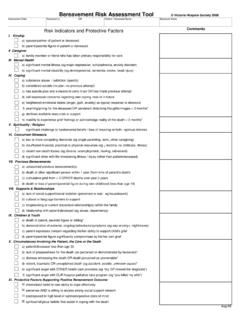Transcription of Child and Teen Grief - Victoria Hospice
1 Child and Teen GriefInformation for Parents and CaregiversBereavement ServicesSupporting Children and teens through Grief ..1 The Grief Journey ..2 Children Aged 3 to 5 ..4 Children Aged 6 to 8 ..9 Children Aged 9 to 11 ..14 Young Adolescents Aged 12 to 14 ..19 Older Adolescents Aged 15 to 17 ..25 Table of Contents 1 Supporting Children and teens through GriefIf your children are old enough to love, then they are old enough to grieve. After the death of a family member or friend, children and teens need to know what to expect and how to deal with any troubling thoughts and feelings that may surface. It is important for you to be as open as possible with whatever emotions and questions come a parent, you may be faced with the challenges of coping with your own Grief at the same time your children will need support with theirs.
2 There may be times when you find it hard to listen to their anger or sadness because it brings out your own deep emotions. Try to remember that your children are learning from you, and may benefit from being included in your grieving families, everyone grieves in their own way and in their own time. This can present challenges and may require extra patience, understanding and compromise. Just like adults, children and teens have a grieving style , which may lean towards a task-oriented or an emotion-oriented Neither one is the right way to grieve; and most people s grieving style is a combination of both. Children and teens who are more task-oriented may need to return to old routines or may focus on activities, such as artwork, play or sports.
3 They may benefit from opportunities to remember the person who has died in concrete ways, such as creating a memory book or special object. Children and teens who are more emotion-oriented tend to talk more about their feelings. Feelings such as sorrow, anger or fear can sometimes explode in loud or big outbursts. It is important that there are oppor-tunities for children to share these feelings and to receive comfort and support from you. If you feel unable to provide this, is there another adult who may be able to do so? This could be a family member, friend, volunteer or information in this booklet is offered only as a guideline to help you anticipate and understand the changing needs of your children and teens after a death.
4 They will grieve in ways that reflect their individual personality, developmental under-standing, previous experience with loss, and the support and information available to them. Because your Child s understanding and needs may not fit within his or her particular age group, you may find it helpful to read information for children who are either older or younger than your Adapted from Terry L. Martin & Kenneth J. Doka. Men Don t Do Transcending Gender Stereotypes of Grief . 2 The Grief JourneyWe have chosen the image of the labyrinth as a metaphor for the journey through Grief . A labyrinth is not a maze as there are no dead ends and no wrong turnings.
5 There is only one way forward. So it is with Grief . The only way through is forward, with many turns and going back and forth over what seems like the same territory. We journey to the centre of our Grief , to the centre of ourselves, and then slowly return to re-enter the person s experience on the journey of Grief will be different. This is a reflection of our personal style, our relationship with the person who died, our internal and social resources, and our past history of coping. As you journey through your own Grief process, there will likely be unexpected turns and a death occurs Walking the EdgesSocialAvoidance of peers or social situationsIncreased dependence on parents or caregiversPHYS icalDizziness, restlessness, and weaknessDiarrhea, constipation, vomiting or stomach acheChanges in appetite and sleep patternsEMoTioNalWithdrawal or explosive temper tantrumsNumb or flat expressionFeeling alone or scaredMENTalConfusion and disbeliefPoor concentration and forgetfulnessFocused on the topic of death or the person who diedSPiriTualBlaming God, parents or selfWishing to die.
6 Or to be with the person who diedNo belief in the future (older children)Important remInderInclude your Child in remembrance rituals. 3 The Grief JourneyAdjusting to loss Entering the DepthsSocial Wanting (but not asking for) the attention of parents and other important adults Self-consciousness with friends about the lossPHYS icalContinuation of earlier responsesLow energyMay have symptoms of the illness that the person died fromEMoTioNalUnexpected mood swingsFeeling hopeless, sad, guilty, fearful or angryAcute sense of missing the person and yearning for the person to come back to lifeMENTalDaydreaming, forgetfulness and confusionDoubt or denial about the cause of death or its permanenceSPiriTualContinued blaming of God.
7 Parents or selfMay seek comfort in thoughts and questions about Heaven or saying prayersImportant remInderRecognize and support your Child s unique style and pace through life goes on Mending the HeartSocialRestored desire for independenceInterest in new activities and friendshipsPHYS icalReduction of previous physical responsesRenewed energy for activityReturn to usual sleep and eating patternsEMoTioNalEmotions settle down and become less intenseMore happiness and self confidence Less guilt, fear and angerMENTalImproved concentration and understandingLess focus on the death and the person who diedIncreased maturitySPiriTualReconnection with faith and less blameAble to forgive self, parents and oth-ersImportant remInderExpect periodic returns to grieving at significant transitions in your Child s life.
8 4 Developmental Information at this age children think in magical, self-centred, physical and connected ways. Children of this age will see them-selves as the centre of most things they experience. They believe that their thoughts and behaviours are the cause of events, and that things that happen at or close to the same time are related. For example, if in a fit of anger, your Child wished you dead and then you became sick, she may believe that she caused your illness to happen. Unfortunately, when a Child of this age gets such an idea as this it can be very difficult for her to revise her thinking. If you sense that this has happened, you will need to help your Child understand that nothing she said, did or felt caused the illness or death.
9 Often it is necessary to reassure your Child more than once that she is not to blame for what has happened. in terms of how children aged 3 to 5 feel, there are two things to remember: they are anxious when separated from parents or primary caregivers and they are distressed by expressions of powerful emotion from adults. At this age children will feel scared and responsible when they see a parent or other significant adult in distress ( , prolonged tears, loud sobbing or slamming of doors). For example, you might be driving with your children and unexpectedly be overcome with the rage and sadness that you feel about your father s sudden death.
10 These strong feelings might affect your interactions with your children and you might find yourself crying and yelling at them about something minor. If this sort of thing happens, it is important that your children see you recover from your emotion and that you carefully and calmly explain to them what you were feeling and why. children of this age tend to have little contact with systems outside the family. Relatives and perhaps daycare or preschool staff are often the Child s only contact with the world outside your family. When someone in the family is ill, this often means that your Child will visit a number of new places (hospitals) and meet new people such as doctors and nurses.





